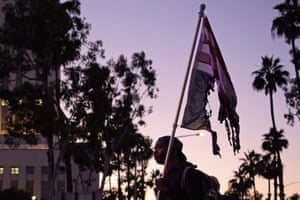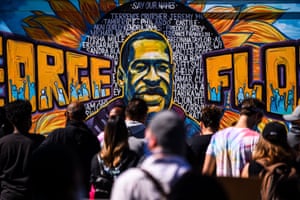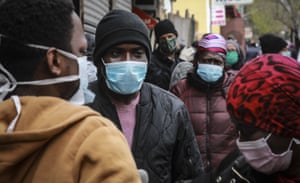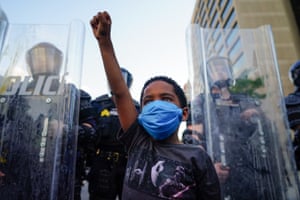In life and death, George Floyd’s plight reflected the burden of being black in America
Floyd’s struggles resonate with many black Americans and the timing of his killing created a spark that lit this week’s uprising over centuries of racism
- George Floyd killing – latest US updates
- See all our George Floyd coverage

Photograph: Agustin Paullier/AFP/Getty Images
With a knee to his neck and head against the concrete, George Floyd became the face of one of the largest uprisings in modern American history. His final moments at the hands of four Minneapolis police officers was replayed on social media and television all across a country that was already in crisis.
America is in an economic free fall as a result of the coronavirus pandemic. And it is black Americans who have been disproportionately impacted by mounting deaths and crushing job losses, making up a disproportionate number of the 42 million people left unemployed.
Black Americans, already subjected to generations of systemic racism, were now more likely to die from the coronavirus and also faced losing their jobs in higher numbers as a result of record unemployment.
George Floyd, then, was no exception.
State medical examiners confirmed this week that Floyd had contracted the coronavirus by late-April. He had also lost his job. But that didn’t cause his death.
Instead, Floyd died from what historian Carol Anderson called “the longest ongoing saga in American history”.
“We saw racial terror: a cop with a knee in [Floyd’s] neck, a soulless look and a casual disregard for life,” she said. “That angst and hurt came before we ever knew that [Floyd] had the virus, because it resonated with us as people.”
At his memorial service on Thursday, family attorney Ben Crump said that Floyd had not died from coronavirus but that the “pandemic of racism” had taken his life.

While his death has come to symbolize the plight of black people navigating the criminal justice system, for many, Floyd’s life and the timing of his killing underscores the burden of being black in America, and created the spark that lit this week’s uprising.
“It was bound to happen here in Minneapolis and all across the country,” said Dara Beevas, a restaurateur and activist who has lived in the city for more than 15 years. She said that black communities are rendered nearly invisible, silencing inequality.
“When you give people so many signals that their history, culture and humanity does not matter, you will see a rejection, a revolt,” Beevas said.
Floyd’s life is a familiar story of falling or being knocked down and picking yourself back up as a black man in America. Although imperfect, he was a man described as hard-working by his peers in Minneapolis and a community staple and mentor, in his native Houston.
He left Texas for Minnesota in 2014, in search of better opportunities after being released from prison for aggravated robbery. The Great Migration of much of the 20th century saw millions of African Americans make that same journey, mostly attempting to escape racism in the south and in search of upward mobility in the north.
Instead racism violently confronted Floyd in Minnesota, a state in which black residents are more than 13 times more likely to be killed by police.
The state’s African American residents are only 6.8% of the population, concentrated primarily in the Twin Cities of Minneapolis and St Paul. Like much of black America in densely populated cities, that is also where coronavirus cases have been highest. Black Minnesotans are 16% of the state’s nearly 25,000 confirmed cases and deaths.
The cardiovascular disease and hypertension cited in Floyd’s official autopsy are also underlying risk factors that make black Americans more susceptible to contracting and dying from the virus. Other risks factors include obesity and diabetes.
For Beevas, the multiple iniquities that face black Americans fell on deaf ears until they were amplified by screams of “I can’t breathe” as Floyd lay dying on a Minneapolis street.
“By standing up for [Floyd], an overlooked, yet over-policed community of people accustomed to not being seen stood up for themselves and that message spread all over,” she said.
A report from the Economic Policy Institute unpacks how inequities exacerbated the impact of the coronavirus crisis on black communities.
Black people are twice as likely to lack health insurance and to live in medically underserved communities. They also represent a majority of workers in most essential industries, often putting them at the frontlines of the pandemic.
Elise Gould, lead researcher and senior economist, said “when black workers lose their jobs, a history of discrimination and inequality” can make rebounding harder.

“[Black Americans already] experienced a much higher unemployment rate, larger wage gaps, have lower median household incomes and higher poverty rates, all things that keep them from being able to weather the storm of job loss.”
When the restaurant where he worked shut down due to Minnesota’s stay-at-home order, Floyd became one of the 44% of Africans Americans to lose their jobs.
Black Americans like him have felt the brunt of the economic spiral. The Federal Reserve found that of households making less than $40,000 a year, nearly 40% of those employed in February lost their jobs in March or at the beginning of April.
That’s nearly half of all black households.
Author and academic Carole Anderson contends that “usually, multiple national crises happening at once sparks unrest.” While headlines may describe these as unprecedented times, especially for African Americans, this is nothing new.
“Abolitionists were essential to getting America into a Civil War,” Anderson noted. “They refused to let the US slide by pretending that slavery wasn’t a horrific practice.”
Still, she acknowledges there’s a different energy this time, and not just because Floyd’s “is one of the most egregious modern examples of the contradiction between what [the US] says it stands for versus what it really is”.
Anderson places the difference squarely on who is leading a “preventable, yet unprecedented crisis”: Donald Trump.
She fought back tears as she recalled watching Floyd’s last moments, weeping in horror as she heard a man call out for his mother who had died two years earlier. For her, it was the cry of a man who had given up.
For others, it was a call to action.

Dionne Smith-Downs traveled from California to attend one of Minneapolis’ many protests since Floyd’s death. She lost her own son to police violence in 2010, so when Floyd “called out for the mothers,” she felt it personally.
“When he said ‘Mama’, I knew I had to come,” she told Breakthrough News. “I heard him and that is why I’m here.”
All four police officers involved in his arrest have been fired. Derek Chauvin, the 19-year veteran seen kneeling on Floyd’s neck, has been charged with second degree murder and manslaughter while the other three officers were charged as witnesses.
American history is littered with promises of atonement and reform, but they’ve been mostly left unfulfilled, even after the police killings that gave rise to the Black Lives Matter movement.
“Protests are bigger this time because there’s finally more of an understanding that the onus isn’t on black people to resolve this,” Beevas said. “We’re no longer questioning the existence of oppression. Our communities have been saying ‘I cannot breathe’ for centuries.
“It’s just a matter of America listening now,” she said. Floyd’s life and death resonated because, for many, the story of struggle, triumph, and perseverance only to fall victim to an unequal system is that of black history in America.
Georgia congressman John Lewis, one of the original Freedom Riders who was notoriously beaten by mobs during the civil rights movement, remarked on the NBC’s Today Show Thursday that while he “been down this road before”, this time “gives [him] hope as a nation, and as a people.”
“We’re going to get there. We’re going to make it,” he said, signaling to a new generation of leaders combating a generational struggle. “We’re going to survive and there will be no turning back.”



